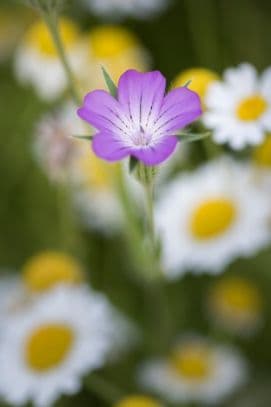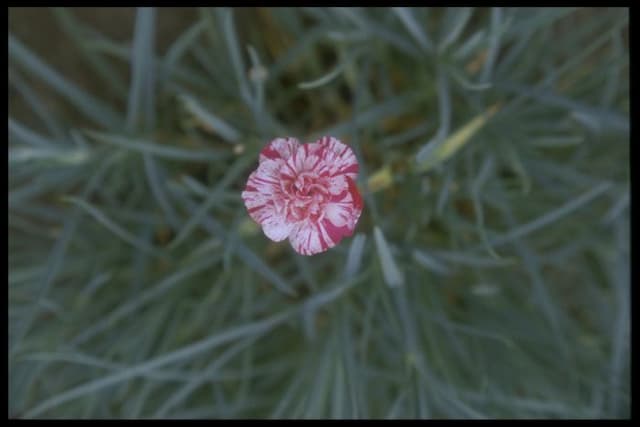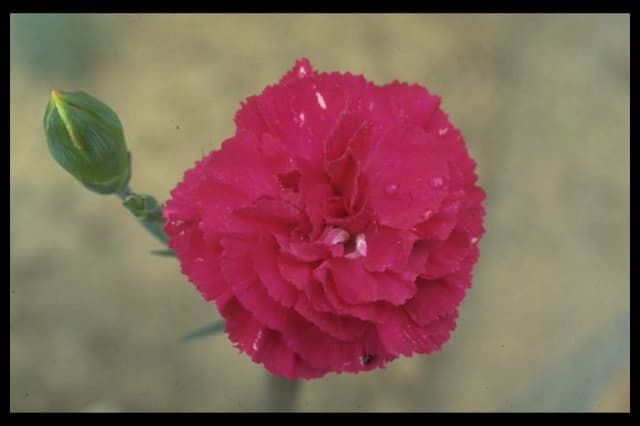Pink Dianthus 'Devon Isolde' (PBR) (p)

ABOUT
Dianthus 'Devon Isolde' is a charming perennial plant, distinguished by its delightful clove-scented flowers. The blooms come in a striking shade of soft pink, boasting a delicate pale center which gradually transitions to a deeper rosy pink towards the petal edges. The petals themselves are elegantly fringed, giving the flowers a textured and intricate appearance. Each blossom typically has five petals, arranged in a symmetrical pattern around a central eye, adding to their traditional, yet timeless beauty. The foliage of Dianthus 'Devon Isolde' is slender and blue-green in color, forming a neat, low mound that serves as a lush backdrop to the vibrant flowers. The leaves are somewhat grass-like, with a linear form and a smooth edge, contributing to the plant's overall tidy and compact aesthetic. This plant is not only valued for its visual appeal; its fragrance adds an additional layer of enjoyment to any garden setting where it’s planted.
About this plant
 Names
NamesFamily
Caryophyllaceae.
Synonyms
Devon Cottage Pink, Isolde Pink.
Common names
Dianthus 'Devon Isolde' (PBR) (p).
 Toxicity
ToxicityTo humans
The plant commonly known as Pink (Dianthus) generally has a reputation for being non-toxic to humans. There is no significant evidence to suggest that Dianthus 'Devon Isolde' poses a threat if touched or ingested. However, like with any plant material, it is possible for sensitive individuals to experience mild irritation of the skin, mouth, or stomach if they have specific allergies or sensitivities. Ingesting any part of the plant in large amounts might cause gastrointestinal discomfort, but serious poisoning is unlikely.
To pets
Pinks (Dianthus), including Dianthus 'Devon Isolde', are not commonly listed as toxic to pets. They are typically considered safe for dogs and cats, and there is no widespread documentation of poisoning from ingesting this plant. That said, individual pets may have unique sensitivities, and consuming plant material can sometimes lead to mild digestive upset such as vomiting or diarrhea. If you notice your pet displaying any unusual symptoms after ingesting this plant, it is advisable to consult with a veterinarian.
 Characteristics
CharacteristicsLife cycle
Perennials
Foliage type
Evergreen
Color of leaves
Blue-green
Flower color
Pink
Height
1 foot (30 cm)
Spread
1 foot (30 cm)
Plant type
Herb
Hardiness zones
5
Native area
Europe
Benefits
 General Benefits
General Benefits- Attractive Aesthetics: Dianthus 'Devon Isolde' (PBR) (p), commonly known as Pink Kisses, has a charming appearance with its distinctive pink flowers that add visual appeal to gardens and landscapes.
- Long Flowering Period: This plant typically has a long blooming season, providing a consistent and lengthy display of color.
- Fragrance: Pink Kisses often exude a pleasant fragrance that can enhance the sensory experience in a garden or when used in cut flower arrangements.
- Drought Tolerance: Once established, it is quite resistant to drought, making it ideal for gardens in drier climates or for gardeners seeking low-water plants.
- Easy to Grow: This plant is known for its ease of care, making it a suitable choice for novice gardeners or those with less time for maintenance.
- Attracts Pollinators: The flowers of Pink Kisses can attract butterflies and bees, which are beneficial for pollination in the garden.
- Compact Size: It has a compact growth habit, making it an excellent choice for small gardens, borders, containers, or as ground cover.
- Versatile Use: Pink Kisses is versatile and can be used in various garden designs, including rock gardens, cottage gardens, and urban balconies.
- Resilience to Pests: This plant shows a good resilience against many common pests, reducing the need for chemical treatments.
- Cold Hardy: It is relatively cold-hardy, which means it can withstand cooler temperatures and is suitable for many temperate regions.
 Medical Properties
Medical PropertiesThis plant is not used for medical purposes.
 Air-purifying Qualities
Air-purifying QualitiesThis plant is not specifically known for air purifying qualities.
 Other Uses
Other Uses- Dye Production: The petals of the Dianthus can be used to create a natural dye for fabrics or art projects.
- Culinary Garnish: The flowers of the Dianthus can be used to add a splash of color and a mild spicy flavor as an edible garnish for salads and desserts.
- Perfumery: Dianthus flowers can be used in the production of perfumes or scented oils due to their fragrant nature.
- Artistic Inspiration: The beauty of Dianthus flowers can serve as inspiration for artists and photographers, capturing their vivid colors and textures.
- Crafts: Dried Dianthus flowers can be used in scrapbooking or as part of a dried flower arrangement.
- Potpourri: The fragrant flowers of the Dianthus can be dried and added to potpourri mixtures to scent rooms.
- Bookmarks: Dried Dianthus petals can be laminated to create unique and decorative bookmarks.
- Wedding Confetti: Dried petals of Dianthus can be used as biodegradable confetti for weddings or celebrations.
- Floral Ice Cubes: The blooms can be frozen in ice cubes to create an attractive and unusual addition to drinks at special events.
- Candle Decoration: Dianthus petals can be embedded in candles to enhance their aesthetic appeal while burning.
Interesting Facts
 Feng Shui
Feng ShuiThe plant Pink is not used in Feng Shui practice.
 Zodiac Sign Compitability
Zodiac Sign CompitabilityThe plant Pink is not used in astrology practice.
 Plant Symbolism
Plant Symbolism- Love and Admiration: Dianthus, commonly known as "pinks," is often associated with love and admiration. The name 'Devon Isolde' may evoke themes of passionate love, as Isolde is a name tied to the tragic romance of Tristan and Isolde.
- Boldness: With its bright colors, Dianthus often symbolizes boldness or making a bold statement. The 'Devon Isolde' could be seen as embodying this quality with its distinctive appearance.
- Durability: Dianthus plants are known for their hardiness, which can be a symbol of durability and the ability to withstand challenging conditions.
- Divine Favor: In historical contexts, pinks like Dianthus were associated with the gods and believed to carry divine favor. They were used in garlands for ceremonies to invoke protection or approval from the divine.
- Pure Affection: These flowers are also a symbol of pure affection, conveying a message of platonic love and intimacy that is deep yet not necessarily romantic.
 Water
WaterPink kisses, commonly known as Dianthus 'Devon Isolde', should be watered deeply whenever the top inch of soil feels dry to the touch. This often equates to watering about once or twice a week, depending on the climate and weather conditions. Use a watering can or hose to gently soak the soil around the plant, avoiding wetting the foliage directly to prevent disease. In general, aim to provide the plant with approximately one gallon of water per week during active growing months, adjusting for rainfall and high temperatures which may require more frequent watering. It's crucial to maintain a balance, as both overwatering and underwatering can lead to health issues for the plant.
 Light
LightPink kisses thrive best in full sun conditions, which means they require at least six hours of direct sunlight each day. An ideal spot for these flowers is in a south-facing garden where they receive plenty of light throughout the day. However, in extremely hot climates, they will appreciate some afternoon shade to protect them from the most intense heat of the day.
 Temperature
TemperaturePink kisses are quite hardy and can tolerate a wide range of temperatures, but they perform best in conditions that are not too extreme. They can survive temporary dips down to about 20°F and are comfortable in temperatures up to about 85°F. For optimal growth, maintaining an environment between 60°F and 75°F is ideal.
 Pruning
PruningPruning Pink kisses is necessary to maintain a neat appearance and encourage continuous blooming. Deadhead spent flowers regularly to promote more blooms and trim back the plant slightly after the first wave of flowering to rejuvenate growth. The best time for heavier pruning is in early spring before new growth begins. Generally, pruning can be done every few weeks during the blooming period to keep the plant tidy and healthy.
 Cleaning
CleaningAs needed
 Soil
SoilDianthus, commonly known as Carnations or Pinks, thrives in well-drained, sandy or loamy soil with a neutral to slightly alkaline pH level of 6.5 to 7.5. A good mix would be equal parts of garden soil, sand, and compost or well-rotted manure to provide adequate nutrients and drainage.
 Repotting
RepottingCarnations, particularly the 'Devon Isolde' variety, do not require frequent repotting and can be done every two to three years or when they outgrow their current container. Ensure the new pot is only slightly larger than the previous one to prevent waterlogging.
 Humidity & Misting
Humidity & MistingCarnations prefer a moderate humidity level but are quite adaptable and can tolerate lower humidity levels typical of indoor environments. They do not need high humidity to flourish, thus making them suitable for most homes without the need for additional humidity control.
 Suitable locations
Suitable locationsIndoor
Place Carnation 'Devon Isolde' in a sunny spot indoors with well-draining soil.
Outdoor
Grow Carnation 'Devon Isolde' in full sun with good air circulation outdoors.
Hardiness zone
5-9 USDA
 Life cycle
Life cycleDianthus 'Devon Isolde', commonly known as Pink, begins its life as a seed, which upon germination, develops into a small seedling. The seedling stage is characterized by the growth of roots and a few leaves as it establishes itself. As the plant transitions to the vegetative stage, it produces more foliage, builds a robust root system, and prepares for flowering. During the flowering stage, it produces its distinctive fragrant flowers, which can be pink, red, or white, typically in late spring to early summer. After pollination, the plant may produce seeds, completing the reproductive cycle. Finally, Pinks are perennial plants, so after flowering, they enter a period of dormancy during the colder months, conserving energy to regrow the following season.
 Propogation
PropogationPropogation time
Spring-Summer
The Dianthus 'Devon Isolde' (PBR), often known as Pink or Carnation, is most commonly propagated through cuttings. This process should take place during the late spring or early summer when the plant's growth is vigorous. To propagate by cuttings, a gardener would select a non-flowering shoot and cut a piece around 4 inches (about 10 cm) long. The lower leaves are removed, and the cut end may be dipped in rooting hormone powder to encourage root development. The cutting is then planted in a moist, well-draining potting mix, ensuring that at least two nodes are buried where leaves were removed. The pot should be placed in a warm area with indirect light, and the soil should be kept consistently moist but not waterlogged. Roots typically develop within a few weeks, at which point the cutting can be transferred to a larger pot or outdoor location.









